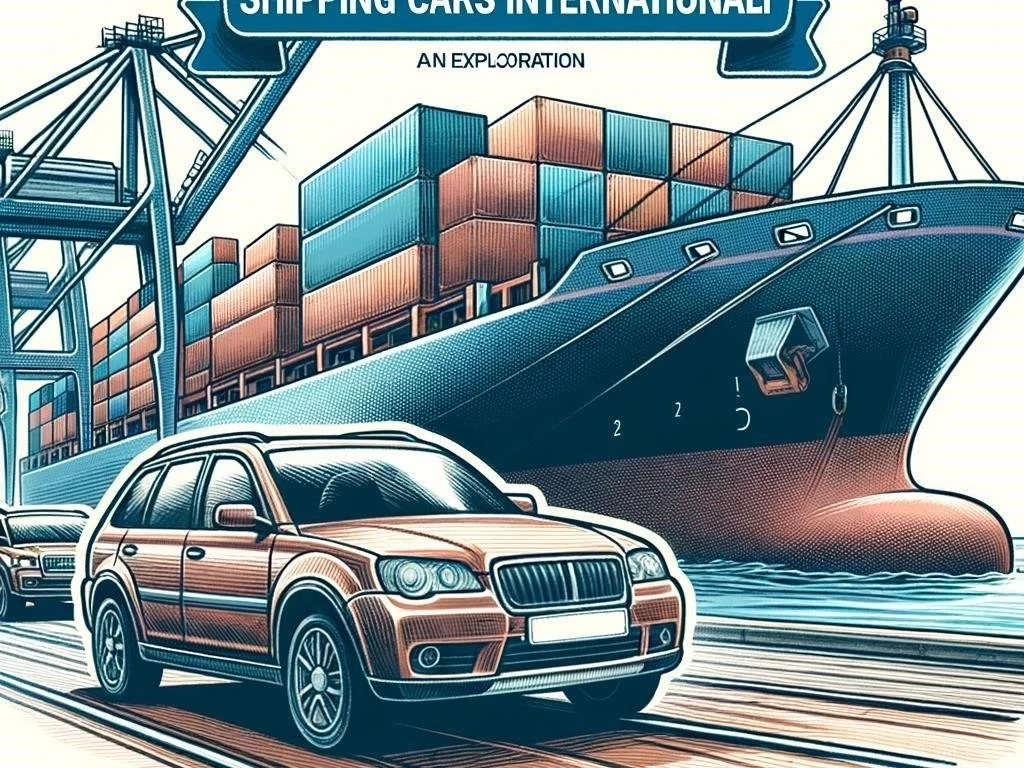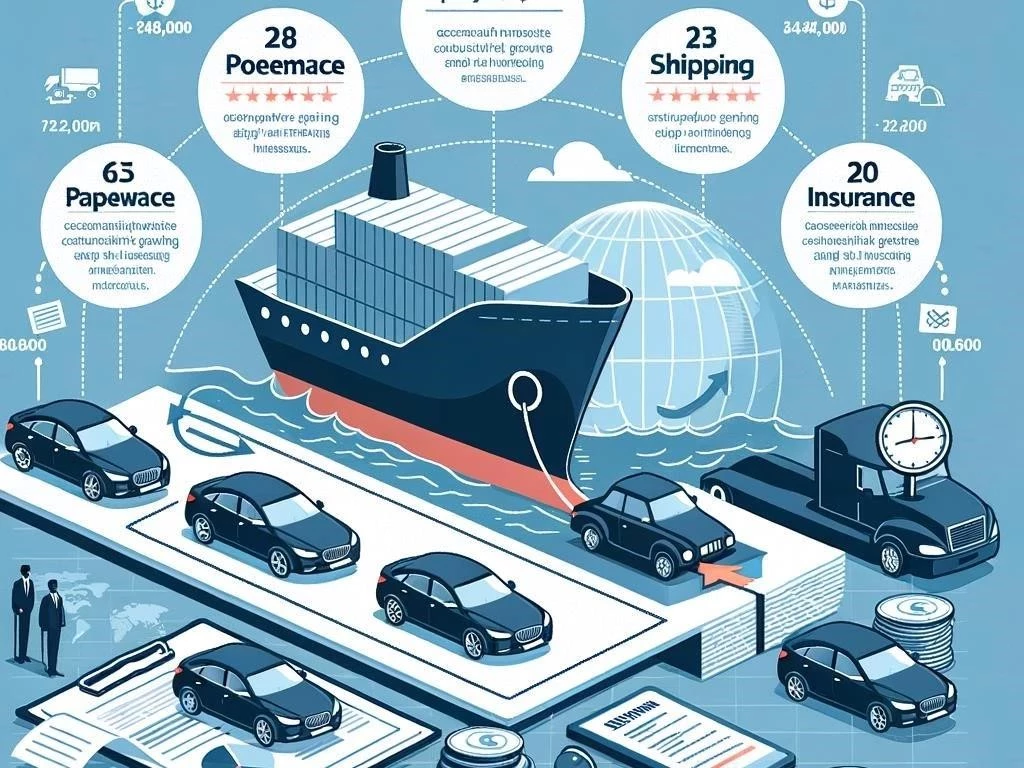How Much Is It to Ship a Car Internationally?
The cost to ship a car internationally varies significantly based on factors like distance, shipping methods, and carrier services. Understanding these elements helps determine accurate auto shipping rates and overall expenses.
Understanding Shipping Costs
When considering international car shipping, understanding the shipping cost is crucial for budgeting and planning. The overall shipping cost encompasses various elements, including distance, vehicle size, and shipping methods. The type of vehicle transport chosen, such as container shipping or roll-on/roll-off shipping, significantly affects the price. Container shipping typically involves higher freight charges due to the enclosed space, while roll-on/roll-off shipping is more economical for standard vehicles.
Additionally, the shipping companies you select can influence auto shipping rates. It’s essential to request car shipping quotes from multiple providers to compare prices and services. Be mindful of additional costs like customs fees and import taxes, which may arise upon arrival. Understanding these factors allows for a more accurate estimate of total expenses, helping you avoid unexpected financial burdens. Finally, consider the logistics involved, including pickup locations and delivery time, as these can also impact the overall shipping cost. A comprehensive understanding of these elements ensures a smoother international car shipping experience.
Factors Affecting Auto Shipping Rates
Several factors influence auto shipping rates when transporting a vehicle internationally. First and foremost, the distance between the pickup and delivery locations plays a significant role; longer distances typically incur higher shipping costs. Additionally, the type of vehicle being shipped affects the price. Larger or heavier vehicles may require special handling, leading to increased freight charges.
Another crucial aspect is the chosen shipping method. Container shipping often comes with higher costs due to the added security and protection it offers, while roll-on/roll-off shipping is more budget-friendly for standard vehicles. Furthermore, seasonal demand can impact rates; for example, costs might rise during peak shipping seasons or when shipping companies experience high demand.
Lastly, the reputation and reliability of shipping companies can also affect pricing. Established carriers may charge more due to their proven track record, while newer companies might offer lower rates to attract customers. Understanding these factors will help you make informed decisions regarding international car shipping.

Types of Vehicle Shipping Services
When shipping a car internationally, there are several types of vehicle shipping services to consider, each with its own advantages and costs. The most common methods include container shipping and roll-on/roll-off (RoRo) shipping. Container shipping involves placing the vehicle in a secure container, providing protection from external elements during transit. This method is often preferred for luxury or classic cars due to enhanced security, but it usually comes with higher shipping costs.
On the other hand, roll-on/roll-off shipping is a more economical option, where vehicles are driven onto a specialized vessel and secured for transport. This method is suitable for standard cars and trucks, making it a popular choice for many shippers. Additionally, some shipping companies offer door-to-door services, picking up and delivering the vehicle directly to specified locations, which can add convenience but may also affect the overall cost.
Ultimately, selecting the right type of vehicle shipping service depends on your budget, vehicle type, and personal preferences, ensuring a smoother international shipping experience.
Comparing Shipping Methods
When considering how much it costs to ship a car internationally, comparing shipping methods is essential for making an informed decision. Two primary shipping methods dominate the market: container shipping and roll-on/roll-off (RoRo) shipping. Container shipping offers a higher level of security, as vehicles are enclosed in a container, protecting them from potential damage during transit. However, this service typically incurs higher freight charges, making it more suitable for luxury or vintage vehicles.
In contrast, roll-on/roll-off shipping is often more affordable, as vehicles are driven directly onto the vessel without additional protective measures. This method is efficient for standard vehicles and can be a cost-effective option for those on a tighter budget. However, it exposes the vehicle to the elements and potential damage during loading and unloading.
Additionally, delivery time can vary between methods, with container shipping generally taking longer due to the logistics involved. Assessing your budget, vehicle type, and required delivery timeline will aid in choosing the most suitable shipping method for your needs.
Estimating Freight Charges
Estimating freight charges is a vital step in understanding how much it costs to ship a car internationally. These charges vary based on numerous factors, including the chosen shipping method and the distance between pickup and delivery locations. For instance, container shipping typically incurs higher freight charges due to the added security and protection it offers, while roll-on/roll-off (RoRo) services generally provide a more budget-friendly option.
Additionally, the size and weight of the vehicle significantly impact freight charges. Larger or heavier vehicles may require a larger container or additional handling, leading to increased costs. To obtain accurate estimates, it’s essential to gather car shipping quotes from multiple shipping companies. These quotes often include a breakdown of costs, which helps in comparing prices effectively.
Moreover, be aware of potential additional costs that could arise, such as customs fees and import taxes, which should be factored into the overall budget. By thoroughly estimating freight charges, you can make informed decisions that align with your financial plans for international vehicle shipping.
Customs Fees and Import Taxes
When shipping a car internationally, understanding customs fees and import taxes is crucial in determining the overall cost. Customs fees are charges imposed by the destination country for processing the vehicle through customs. These fees can vary widely depending on the country and the vehicle’s value, making it essential to research specific regulations and requirements beforehand.
Import taxes, often referred to as tariffs, are typically calculated as a percentage of the vehicle’s declared value. These taxes can significantly affect the total cost of shipping a car internationally, sometimes leading to unexpected expenses upon arrival. It’s essential to have accurate documentation, including the bill of lading and customs declarations, to avoid delays and additional charges.
Additionally, certain countries may have exemptions or reduced rates for specific vehicle types, which can help mitigate costs. Engaging with a knowledgeable customs broker can simplify the process and ensure compliance with all regulations. By factoring in customs fees and import taxes, you can create a more accurate budget for your international car shipping needs.
Getting Car Shipping Quotes
Obtaining car shipping quotes is a fundamental step in understanding the costs involved in shipping a vehicle internationally. Begin by researching reputable shipping companies that specialize in international car transport. Many companies offer online quote tools, which allow you to input essential information, such as vehicle details, pickup and delivery locations, and desired shipping methods. This initial information helps generate accurate quotes tailored to your specific needs.
When gathering quotes, be sure to compare multiple options to ensure you receive the best deal. Take note of the services included in each quote, as some companies may offer comprehensive packages that cover insurance, customs assistance, and door-to-door delivery. Additionally, consider the reputation of the shipping companies, looking at customer reviews and ratings to gauge their reliability and service quality.
Once you receive several car shipping quotes, evaluate the overall value rather than just the price. A slightly higher quote may offer superior service and peace of mind during the international shipping process, making it a worthwhile investment.
Insurance and Delivery Time
When considering how much it costs to ship a car internationally, it’s crucial to factor in both insurance and delivery time. Insurance protects your investment during transit, covering potential damages or losses. Most shipping companies offer various insurance options, which can influence the overall shipping cost. It’s essential to assess the level of coverage required based on your vehicle’s value and your personal comfort level with risk.
Delivery time is another key element that can affect costs. Different shipping methods have varying transit times; for instance, container shipping may take longer due to additional handling and logistics. In contrast, roll-on/roll-off (RoRo) shipping typically offers faster delivery times, making it a popular choice for standard vehicles. However, if speed is a priority, be prepared for potential increases in shipping costs.
Additionally, external factors like customs clearance and seasonal demand can impact delivery times. By understanding the relationship between insurance, delivery time, and shipping costs, you can make informed decisions that align with your budget and timeline for international vehicle transport.
Choosing the Right Shipping Company
Selecting the right shipping company is a pivotal factor in determining how much it costs to ship a car internationally. Begin by researching companies that specialize in vehicle transport and have a solid reputation in the industry. Look for customer reviews and testimonials to gauge the reliability and quality of service provided. A well-established company typically has experience dealing with various logistics, customs, and potential complications that may arise during the shipping process.
Request quotes from multiple shipping companies, ensuring that you compare not only the costs but also the services offered. Some companies may include insurance, customs assistance, or door-to-door delivery, which can provide additional value. It’s also essential to inquire about the shipping methods available, such as container shipping or roll-on/roll-off, as this can impact both cost and vehicle safety.
Furthermore, ensure that the shipping company complies with all regulatory requirements and offers adequate insurance coverage. By carefully evaluating your options, you can choose a shipping company that aligns with your budget and ensures a smooth international car shipping experience.








